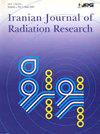螺旋调强放疗对脑转移患者同步综合增强的临床评价
Q4 Health Professions
引用次数: 0
摘要
脑转移是癌症治疗中一个重要的临床问题,占所有癌症患者的20%至45%(1-2)。脑转移主要起源于肺癌(40-50%)和乳腺癌(20-30%)(3)。20-30%的脑转移患者有3个以上的转移灶,而70-80%的患者有1-3个脑转移灶(4)。在全脑放疗(WBRT)的不同分级和剂量方案下,中位生存期为4-7个月(5-6)。由于放疗(RT)和化疗(CT)的副作用,脑转移瘤的治疗是困难的。尽管有新的治疗方案,生存率仍然没有显著改善(7)。在新的骨髓转移治疗方案中,中位生存期在2-13个月之间(5-6)。多发性脑转移患者的主要治疗方案是联合或不联合类固醇的WBRT。对于14个脑转移部位之间的患者,采用手术和/或放射手术,无论是否采用WBRT。在大量患者中观察到局部和远处脑衰竭。两项前瞻性III期试验显示1年局部和/或远端脑衰竭本文章由计算机程序翻译,如有差异,请以英文原文为准。
Clinical evaluation of simultaneous integrated boost in brain metastasis patients with helical intensity modulated radiotherapy
Brain metastasis is (BM) a signi icant clinical problem in cancer management which occurs on 20 to 45% of all cancer patients (1-2). The primary cancer sites which BM mostly originate from are lung (40-50%) and breast cancer (20-30%) (3). 20-30% of patients with BM have more than 3 metastases, while 70-80% of patients have 1-3 BM (4). The median survival has been observed to be 4-7 months with various fractionation and dose regimens of whole brain radiotherapy (WBRT) (5-6). The treatment of brain metastases is dif icult because of the side effects caused by radiotherapy (RT) and chemotherapy (CT). There is still no signi icant improvement on survival rates despite new treatment schedules (7). Median survival has been observed to be between 2-13 months in new BM treatment schedules (5-6). The primary treatment schedule employed for patients with multiple BM is WBRT either with or without steroids. Surgery and/or radiosurgery, either with or without WBRT was employed for patients with between 1 4 BM sites. With this local and distant brain failure was observed in a substantial number of patients. Two prospective phase III trials have shown a 1-year local and/or distant brain failure ABSTRACT
求助全文
通过发布文献求助,成功后即可免费获取论文全文。
去求助
来源期刊

Iranian Journal of Radiation Research
RADIOLOGY, NUCLEAR MEDICINE & MEDICAL IMAGING-
CiteScore
0.67
自引率
0.00%
发文量
0
审稿时长
>12 weeks
期刊介绍:
Iranian Journal of Radiation Research (IJRR) publishes original scientific research and clinical investigations related to radiation oncology, radiation biology, and Medical and health physics. The clinical studies submitted for publication include experimental studies of combined modality treatment, especially chemoradiotherapy approaches, and relevant innovations in hyperthermia, brachytherapy, high LET irradiation, nuclear medicine, dosimetry, tumor imaging, radiation treatment planning, radiosensitizers, and radioprotectors. All manuscripts must pass stringent peer-review and only papers that are rated of high scientific quality are accepted.
 求助内容:
求助内容: 应助结果提醒方式:
应助结果提醒方式:


